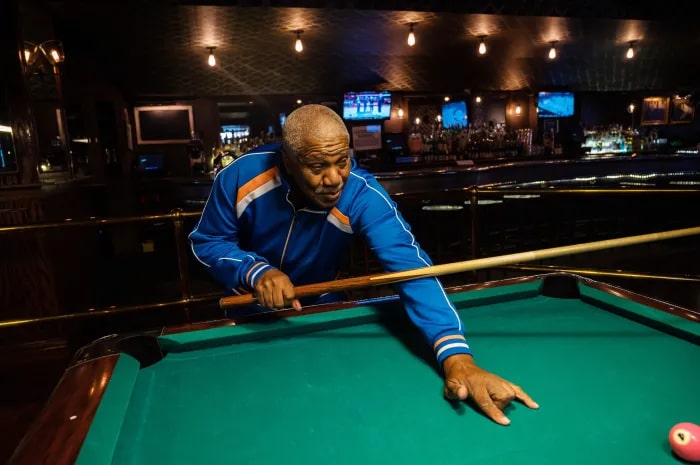Until 1964, black pool players weren’t allowed to compete in the biggest competition in the pool. It was a white man’s sport. Despite no laws to bar them from playing, officials kept them from the sport due to their race. Today, the sport remains largely white and is popular in countries like the United States and the United Kingdom. That notwithstanding, Cisero Murphy opened the way for African-American professional pool players. Here’s how he did it.
Do you want to learn how to play billiards? Check out these books on Amazon.
Become an insider. Subscribe to our newsletter for more top trending stories like this!
People Also Read: African Football: 5 Incredible Strikers in Africa of All Season
Cisero Murphy’s Early Life
Cisero Murphy was born in 1935 in Minersville, Pennsylvania. He was one of eight children raised by his mother after his father abandoned them. Due to the tough living situation, he dropped out of school and began working temporarily. He engaged in sports activities on the weekend.
Read More: Black Women in Sports: Shelly-Ann Fraser-Pryce’s Olympic Gold Medals
Cisero Murphy’s Entry to Pool
Cisero joined a local gym, the Police Athletic League. He desired to be a boxer and this gave him the opportunity. However, one day after his sessions, he lay about and came across a pool room. Cisero received an invite to play and was beaten. That’s when he decided to learn the game, as his son Cisero Jr. told andscape.com
“He didn’t like the humiliation and vowed to my mother, Janie, that he’d never let it happen again,” Cisero Jr.
Cisero left boxing for the pool. He trained without lights as he wasn’t able to pay for the use of a pool table. Instead, he arrived at a deal with the manager; he would clean the area for a chance to practise.
Many argue that shooting in the dark made him the great player he was. He ran 200 balls straight. Cisero would first frame the kind of shot he wanted before committing. This was a unique skill that came to be defined as the ‘hesitation stroke.’
“People heard about Cisero. He was a standout in New York at a time when there were lots of great players,” a billiards tournament director Jay Helfert said.
The world’s greatest e-commerce site, Amazon, has anything you want to buy. Amazon has it all, whether it’s books, clothes, or equipment.
Join our Spotcovery Global Black Community Facebook Group for early access to exclusive content and to share in a lively discussion.
Racial Discrimination
Cisero Murphy won multiple championships in New York. At the age of 16, Cisero won the New York City Championship. He also won the Eastern States 14.1 Championships six consecutive times. Despite his record, Cisero was barred from competing like many other black pool players of the time.
He kept his job as a mechanic but moved from one pool hall to another with his mates James “Cornbread” Thomas and Joseph “Strokey” Armstrong playing to make money.
“These guys knew how to play and they wanted to beat Cisero so they invited him. If we couldn’t get the money we needed out of the other guy, we would beat him. If we could string him along for more money, we’d do that too. We wouldn’t lose to him,” Thomas recalled.
Cisero made a tidy amount, according to Thomas, $6,000.
Become an insider. Subscribe to our newsletter for more top trending stories like this!
People Also Read: Usain Bolt’s Record: Scientists Debate Whether It’s Breakable
Racial Awakening
During the Summer Olympics of 1964, black athletes put up a united front and boycotted the games to protest the injustices faced. The Billiard Room Proprietors Association of America (BRPAA) knew they couldn’t prevent Cisero from competing at the highest level anymore.
They invited him to compete at the World Invitational 14.1 Tournament, a straight pool competition at the American Billiard Parlor in Burbank, California, between January 29 and March 6, 1965. It consisted of 21 players, and the winner won $3500.
Cisero went head-to-head against some of the world’s best pool players like:
- Jack Breit
- Harold Worst
- Luther Lassiter
- Irving Crane
- Joe “The Butcher” Balsis
- “Cowboy” Jimmy Moore
He put on one of the best shows, sinking ball after ball, and even staged a comeback to win the tournament against Joe “The Butcher” Balsis. This made Cisero Murphy the first African American to win the World Invitational 14.1 Tournament.
He broke the racial barriers and was invited to a tournament in New York that was previously for whites only.
Cisero’s friend Armstrong recalled his victory.
“It felt like the greatest thing in the world. They wouldn’t let a Cisero into the tournament and then he beat everybody. A black man became the world’s greatest pool player. Now he’s in the record books.”
Cisero Murphy’s achievement is a comparison to that of Jackie Robinson, who broke the racial barrier for baseball players in the United States. Despite this, the number of black players in billiards remains small. Nonetheless, Cisero showed that anyone, regardless of color can become the best in the game.
If you’re looking for billiards equipment, visit Amazon.
Nearly 80% of consumers visit directories with reviews to find a local business. List your business for free in our exclusive Spotcovery Black-Owned Business Directory.
Spotcovery offers unique and fresh daily content on Black culture, lifestyle, and experiences. We talk about everything black, black people, black-owned and black-owned businesses. We also deliver authentic and relevant content that will inform, inspire, and empower you! The future of black media is critical to today’s black experience! Our primary audience includes African Americans, Africans, Afro-Caribbean, and people of African heritage. Black culture is for the culture!
Become an insider. Subscribe to our newsletter for more top trending stories like this!





